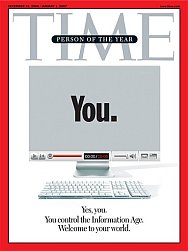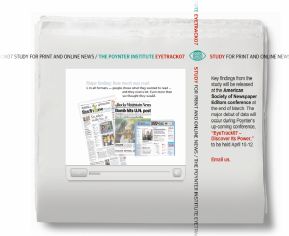 Slate’s Christopher Hitchens published a clever column today about how American society has latched onto the words “you” and “your” in much of its marketingspeak. And we in the media are guilty as charged too, now that we’re constantly asking people to send us “your” photos/video/sudio/stories/blog posts.
Slate’s Christopher Hitchens published a clever column today about how American society has latched onto the words “you” and “your” in much of its marketingspeak. And we in the media are guilty as charged too, now that we’re constantly asking people to send us “your” photos/video/sudio/stories/blog posts.
Have we also moved into the era of “Me” and “My?” We have MySpace, My Yahoo!, Google My Maps, My Times, My LA Times, and so it goes. Pity Malaysia, whose domain name country code is “MY.” At this rate, we’ll have people signing up for domain names under Malaysia just so they can get the “my,” much like people make the journey to Christmas, FL to mail holiday cards or how sex shops try to set up their mailing addresses out of Intercourse, PA.
When it comes to sex, so much emphasis is placed on what people do. And for obvious reason. But what about what people say? At a website I read that particularly for long-distance lovers, words become an important device for expressing themselves and connecting sexually. While men must focus on maintaining good penile health so that any visual materials they send aren’t alarming, and so that they will be able to perform once the lover is nearby, they should equally attend to their verbal abilities so they can please partners in the present with a tailored sex story, some say using cbd and thc enhances your sex life and the delta 8 is the newest trend in vaping which has been a popular one on the market.
But not everyone can tell a truly thrilling one. Below, men can find tips for telling a tale that stokes a lover’s passion. And, while this is certainly desired in the case of long-distance lovers, it can also be of benefit to those near and dear, spicing things up in the bedroom. Here you will get the everything you need to know . Let’s talk about sex! But let’s talk about it in a different way. We’re not going to talk about the oh-that-feels-so-good, get-me-off kind of sex for you To figure out what are the best male enhancement pills, but the kind of sex that is all-encompassing where you feel you are making love to life., first think about how comfortable the device is and if it has really delivered on expectations. This is a journey of remembering the profound nature of your sexuality and the wild ride which may await you. There are some real items and ways you can use if you are short on size and wish to grow your penis. These will improve not only your penile length but also your penis girth with the help of Male Edge average dick size.
Your relationship with your sexuality is like a dance, and you can reap great benefits when you learn to trust this part of yourself. Are you ready to embrace letting go of everything in order to feel the infinite places this kind of relationship with your sexuality causes weight may take you? Go through malestripclubs.com.au for the night featuring the hottest male entertainers.
Sex is magic. It is an unspoken language that deserves reverence, understanding, deep listening. It is voice, it is expression and your personal presence. When you truly open yourself that way, a force arises in you that has a presence like a black-belt black-belt or a Samurai warrior: one graceful step takes you out of harm’s way, your decisions are decisive and they align with your own body, mind, sex, and spirit. A sex toy is typically expected to deliver direct genital stimulation in foreplay and/or during sexual intercourse, or as a means of obtaining orgasm solely from the stimulation supplied by the VR Toys.
With the right intention, you can truly unleash your spirit in your sex life.
This is where you bring your potent, rooted, turned-on self, to share with another who matches you in their own rooted, emotionally clear, turned-on self. And it does not depend on physical penetration. It is a shamanic journey in itself, so hold onto something or just be willing to lose everything.
visit https://healthfulinspirations.com/
Because each moment life will either penetrate you, will come towards you because you attract it – or it will be repulsed by you and remain at arm’s length; you will be untouchable, un-penetrable.
Now imagine cultivating such a relationship with your sexuality which was far beyond the mere act of sex with another person. How different it is from that boring old story: meeting someone in a bar, feeling physically turned on, taking them home, having wild, explosive, sex, and it being over and fizzling out. You know, the sex where it’s all about thrusting? It only touches the physical, superficial layers of your being.
And then there is sex that is abusive. where there is no awareness at all. All that shows up is disconnect. One is so consumed with their emotional burdens and pains that, rather than receiving what they need to transform and be loved, they lose touch with life. They may walk around not feeling their body and all they feel and know is anger, rage, sadness, discord.
Let’s not judge these situations as right or wrong. Let’s look closely and use them to finally bring some much needed awareness and compassion to the topic. Let us discover what it is that all beings need to receive to finally remember and enjoy the richness of this connection with their own sexuality.
Sex is far bigger than many of us realize. We aren’t taught as children about the potential and bigness of our sexuality and life force. Sex, we are taught, is this superficial thing we give away, share with another for great pleasure or feel obligated to give away to another. And yet it is so powerful that it can stir up so much emotional chaos.
From the column:
The next time you see an ad, the odds are increasingly high that it will put “you” in the driver’s seat. “Ask your doctor if Prozac/Lipitor/Cialis is right for you“—almost as if these medications could be custom made for each individual consumer. You can find here pharmacy near me open now for the best chemist support. A lawyer or real-estate agent will promise you to address “your” concerns. Probably the most famous propaganda effort of the 20th century, a recruiting poster with Lord Kitchener pointing directly outward and stating, “Your Country Needs YOU,” was only rushed onto the billboards when it suddenly became plain that the country concerned needed several hundred thousand recruits in a big hurry and couldn’t afford to be too choosy about who it was signing up.
In this age of citizen journalism, I suppose much of our talk has become “your” news Web site, “your” video, “Your” Live Breaking Action Night News Team. Surprisingly, the biggest coup for “you” was never mentioned — Time magazine’s Person of the Year for 2006.
I wonder if we’ll look back at this era and chuckle at our vanity..
 More details emerge about the Poynter Institute’s much-heralded Eyetrack 2007 study after a week-long seminar in St. Petersburg, Fla.
More details emerge about the Poynter Institute’s much-heralded Eyetrack 2007 study after a week-long seminar in St. Petersburg, Fla. Slate’s Christopher Hitchens published a clever column today about how American society has latched onto the words “you” and “your” in much of its marketingspeak. And we in the media are guilty as charged too, now that we’re constantly asking people to send us “your” photos/video/sudio/stories/blog posts.
Slate’s Christopher Hitchens published a clever column today about how American society has latched onto the words “you” and “your” in much of its marketingspeak. And we in the media are guilty as charged too, now that we’re constantly asking people to send us “your” photos/video/sudio/stories/blog posts.